News
STA, 11 October 2019 - After scoring three wins in a row, the Slovenian men's national football team suffered a setback on their way to the final tournament as it lost 1:2 to North Macedonia in Skopje on Thursday evening. They will now have to go for a win against Austria in Ljubljana on Sunday to remain in play.
Three matches to go in Group E of the qualifiers, Slovenia are now tied with North Macedonia at eleven points, trailing Poland (16) and Austria (13), who took care of business yesterday by beating Latvia and Israel, respectively.
Slovenia came to the North Macedonian capital confident they could continue the winning streak but the things proved to be tough in Toše Proeski Arena in front of some 16,500 fans, with the first half ending without goals.
It was Elif Elmas who scored for North Macedonia in the 50th to make things tougher for Slovenia, and the same player converted a nice pass by Arijan Ademi in the 68th minute for what proved to be an insurmountable 2:0 lead for the home team.
Some consolation for Slovenia came in the stoppage time, as they were awarded a penalty kick after a found on Miha Zajc. The veteran attacking midfielder Josip Iličić was precise to set the final score at 1:2.
Slovenia's head coach Matjaž Kek congratulated North Macedonia on "more than a deserved win", adding that Slovenia were "too weak to earn some more."
Turning to what could be a decisive match with Austria on Sunday, he said that "a top quality team is coming to Ljubljana and I hope we will look better than today."
After the match with Austria, there will be a one-month break in the qualifiers before Slovenia play the hapless Latvia (0 points) at home on 16 November and wraps up the campaign three days later in Warsaw against Poland.
STA, 10 October 2019 - The specialised state prosecution dealing with the most demanding while collar crime and corruption cases has lodged two new indictments against Ljubljana Mayor Zoran Janković, the web portal MMC reported on Thursday. He is allegedly suspected of tax evasion and abuse of office.
The first case dates back to 2006, with the prosecution suspecting that the former CEO of retailer Mercator performed a series of complex business transactions in order to evade taxes by selling 47,000 Mercator shares through a company owned by his sons.
Investigators believe that the company was actually controlled by Janković at the time and that he was the actual owner of shares that he parked at the Electa Inženiring company until he sold them.
According to MMC, charges were filed against three persons and a legal entity in this case last week.
The second case goes back to 2009, when Janković is suspected of abuse of office to acquire EUR 1.4 million in illegal gains for Grep, the main constructor of Stožice sports park.
Moreover, he is suspected of document fabrication to allow Grep acquire a EUR 5.5 million loan from Banka Koper. Charges have been filed against five persons and a legal entity, the names reportedly include former Deputy Mayor Jadranka Dakić and Uroš Ogrin and Zlatko Sraka of Grep.
Check the date at the top of the page, and you can find all the "morning headlines" stories here. You can also follow us on Facebook and get all the news in your feed.
A schedule of all the main events involving Slovenia this week can be found here
This summary is provided by the STA:
Slovenia calls on Turkey to end military operation in Syria
LJUBLJANA - Slovenia called on Turkey to end its military operation in north-eastern Syria, protect civilians and respect the international humanitarian law, and also expressed deep concern over the operation. The Foreign Ministry pointed out in a press release that the operation could jeopardise the stability of the region, and the progress achieved in the battle against Islamic State and other terrorist organisations. President Borut Pahor meanwhile labelled the operation unacceptable and said the international community must do everything it can to deter Turkish President Reccep Tayyip Erdogan from using force against Kurds.
Unofficial: Constitutional judges annul disputed aliens act amendment
LJUBLJANA - According to unofficial information obtained by the weekly Mladina, constitutional judges have annulled a controversial clause of the aliens act that would allow the country to take steps to suspend asylum law in the event of mass migration. The court meanwhile told the STA that procedures in the case are still ongoing. The amendments were passed in parliament amid major controversy in January 2017 and took effect on 4 February. They introduced the option for the government to shut its borders to migrants in exceptional circumstances by imposing special, temporary system of border checks that would need to be endorsed by an absolute majority in parliament.
Mixed Slovenian reactions to Nobel prizes in literature
LJUBLJANA - Jana Unuk, the translator behind most of the Slovenian translations of the work of Olga Tokarczuk, hailed the Nobel prize winner, while Peter Handke translator Brane Čop described how taken he was by Handke's Storm Still. Philosopher Slavoj Žižek on the other had dismissed Handke as an "apologist of war crimes". He had nothing good to say about the Nobel prizes in general or for Handke, who has Slovenian roots on his maternal side. "This is Sweden today," Žižek was quoted as saying by the Guardian, "an apologist of war crimes gets a Nobel prize while the country fully participated in the character assassination of the true hero of our times, Julian Assange. Our reaction should be: not the literature Nobel prize for Handke but the Nobel peace prize for Assange."
Protestors rally for equality before law, against corruption
LJUBLJANA - Right-wing parties organised a rally, headlined Save Slovenia. Filling the Prešeren Square, the protestors called against corruption and expressed their dissatisfaction with Prime Minister Marjan Šarec. Organised by the non-parliamentary People's Party (SLS) and former Maribor mayor and upper chamber member Franc Kangler, the rally was also backed by the Democrats (SDS), the biggest opposition party, as well as several non-parliamentary parties and civil initiatives. The SLS said it was attended by 5,000 people, while the police refused to provide an assessment.
Janša demands resignation of intelligence agency head
LJUBLJANA - Democrats (SDS) president Janez Janša called for the resignation of SOVA head Rajko Kozmelj in the wake of the intelligence agency's decision not to give the parliamentary Intelligence Oversight Commission information on the agency's staffing. The call came as SOVA decided to deny the Oversight Commission access to information on the agency's staffing, requested in the wake of allegations that Prime Minister Marjan Šarec had intervened to secure a job to a female friend of his.
Brexit in centre of talks as Pahor meets Irish president
ATHENS, Greece - President Borut Pahor expressed solidarity with Ireland in the face of Brexit as he met President Michael D. Higgins ahead of the Athens Democracy Forum, saying that Slovenia supported efforts for an orderly Brexit, which is in the interest of the EU and the UK. The pair talked about the future of the EU and other topical global issues, but special attention was given to Brexit. Pahor also underlined that Slovenia was fully supportive of the approach adopted by the EU and its head negotiator Michel Barnier.
Slovenian, N Macedonian PMs praise bilateral relations
SKOPJE, North Macedonia - Relations between Slovenia and North Macedonia were in focus as Prime Minister Marjan Šarec met his counterpart Zoran Zaev. He reiterated Slovenia's support that North Macedonia be allowed to launch EU accession talks, expressing hope that the EU summit next week would make a positive political decision. The prime minister's office said in a press release that Šarec and Zaev talked about bilateral relations and ways to strengthen them additionally. They shared the view that the countries nurture a very good relationship of partners at virtually all levels. They expressed satisfaction with regular political dialogue between the countries at all levels and with interest for intensive cooperation in the future.
Govt approves guarantees for two key infrastructure projects
LJUBLJANA - The government endorsed a bill on state guarantee for the loans taken out to fund the planned Koper-Divača rail expansion, and an expressway connecting the north and south of the country, two major infrastructure projects in Slovenia. Infrastructure Minister Alenka Bratušek said the guarantee for the rail project was restricted to EUR 417 million, and for the Third Development Axis at EUR 360 million. The bill will enable the state-owned companies 2TDK and DARS to negotiate on much lower interest rates for the planned loans, the government said. The move seems to have appeased a group which announced a protest for 17 October over delays with the implementation of the expressway project. The group suspended the protest until parliament takes a vote on the bill.
Coalition bury the hatchet over pensions amendment
LJUBLJANA - The coalition agreed to adopt the Pensioners' Party's (DeSUS) amendment for an exceptional adjustment of pensions in 2020 as the coalition-sponsored amendment, while pledging not to submit any new amendments to budget documents. DeSUS upset coalition partners last week by submitting an amendment to the bill on public wage measures in 2020 and 2021 proposing a 1% indexation of pensions in case of economic growth exceeding 2.5%, rather than 3% as proposed in the government bill. Brane Golubović of the Marjan Šarec List (LMŠ) said the adjustment of pensions would only cost between EUR 5 million and 6 million because it would only apply in December 2020.
Coalition to push its own top-up health insurance abolition plan
LJUBLJANA - The coalition announced it was temporarily suspending talks with the Left on the opposition party's plan for the abolition of top-up health insurance and would instead pursue its own proposal. Marjan Šarec List (LMŠ) deputy group head Brane Golubović said that the coalition-backed proposal would likely already be on the table at the start of November. The idea is to abolish the current scheme in two steps, the first being to transfer the collection of all contributions to the public health insurance fund ZZZS. The second step would be drawing up a scale for the collection of health insurance contributions in a progressive manner, which could happen next summer.
Government's proposal to subsidise flights voted down
LJUBLJANA - A bill that would allow the government to subsidise air links vital to Slovenia after the carrier Adria Airways ended in receivership was defeated by the parliamentary Infrastructure Committee. The rejection is an irreversible decision and the National Assembly will now be merely acquainted with it. Infrastructure Minister Alenka Bratušek said the bill was only meant to create a possibility to be applied if foreign airlines did not establish crucial links with Slovenia's capital. However, the opposition Democratic Party (SDS) and Left argued that the proposal was detrimental, in particular because it contained no estimates how it would affect the state budget.
Potential buyers invited to bid for Adria Airways
BRNIK - The official receiver of Adria Airways published an invitation for bids for all remaining assets of the insolvent airline, with interested parties having until 10 November to express their interest. "With the invitation for non-binding bids I would like to check the interest of potential buyers," receiver Janez Pustatičnik said. The remaining assets include the plot of land on which the office building stands, the building title, claims to buyers, aircraft spare parts, equipment and two flats. Initial estimates indicate the mortgaged plot and the building right could be worth EUR 5 million, and there are EUR 1 million worth of claims for repayment of receivables.
Slovenia faces natural disaster due to bark beetle
LJUBLJANA - Slovenia is facing a natural disaster due to an overpopulation of the bark beetle, which has caused EUR 10.5 million in damage so far this year, according to a report by the Slovenian Forest Service, discussed by the government. All conditions have been met to declare a natural disaster, the Forest Service said, while the government tweeted that funds to mitigate the consequences are available in rural development programmes of the current financial perspective of the EU. The increase in bark beetle population was expected after large areas of forest were damaged by strong winds in 2017 in 2018. More than 677,000 cubic metres of trees need to be cut down.
Exports in August up 4.9% year-on-year, imports up by 4.3%
LJUBLJANA - Slovenia exported EUR 2.32 billion worth of goods in August, which is 4.9% more year-on-year, while imports were up by 4.3% to EUR 2.3 billion, according to preliminary data of the Statistics Office. Trade surplus thus stood at EUR 20 million in August, for an exports-to-imports coverage of 100.88%. August was the second month this year in which the value of trade with the EU member states decreased. It was down by 2.5% compared to August 2018 to EUR 1.65 billion. Exports from the EU countries meanwhile reached EUR 1.73 billion, or 1.7% less than in the same month last year, largely because of a drop in trade with Germany as the largest partner to Slovenia.
Industrial output slowing down
LJUBLJANA - The value of industrial output in Slovenia in August was 2% down compared to July and 0.8% higher year-on-year. This was the biggest drop in industrial output at the monthly level this year and the smallest growth at the annual level, the Statistics Office said. Industrial output in August in manufacturing and electricity, gas and steam supply was down compared to July by 1.9% and 0.6%, respectively, while in mining and quarrying it was up 0.5%. Sales revenue in industry was up by 0.7% compared to July, while it was up by 3.4% at the annual level.
Marine Biology Station celebrates 50th anniversary
PIRAN - Slovenia's only institution studying the sea and monitoring its quality is celebrating is 50th anniversary, with the festivities culminating with tonight's ceremony in the coastal town of Portorož. The Piran Marine Biology Station was set up as an independent research centre of the University of Ljubljana's Institute of Biology, the main public research institution for natural sciences in the country. Its main mission is studying the biodiversity of the Slovenian part of the Adriatic Sea, while it is also engaged in a number of other projects.
Marinka Štern wins theatre lifetime achievement award
MARIBOR - Marinka Štern is the recipient of this year's Borštnik Ring for lifetime achievement, the highest accolade conferred in theatre acting. The stage and screen actor, born in 1947, graduated from the Ljubljana Academy of Theatre, Radio, Film and Television (AGRFT) and then worked at the Mladinsko Theatre (SMG). The 72-year-old has also performed in television and radio productions and cooperated with other national and independent theatres. The winner was announced by the organisers of the 54th Maribor Theatre Festival, to be held between 14 and 27 October. Štern will receive the award at the conclusion of the festival, which will feature more than 40 performances.
Triennial of Contemporary Slovenian Arts kicks off
LJUBLJANA - The U3 Triennial of Contemporary Slovenian Arts will kick off at the Moderna Galerija museum of contemporary art today, exploring three contradictory states - the living and the dead conceptualism, the analogue and fluent material world, and the subconscious as the battlefield of cognitive capitalism. A total of 26 artists and groups coming from five countries are presented at the exhibition, which will be open until 12 January.
Visiting Ljubljana? Check out what's on this week, while all our stories on Slovenia, from newest to oldest, are here
If you're learning Slovenian then you can find all our dual texts here
STA, 10 October - Right-wing parties organised a rally in Ljubljana Thursday afternoon, headlined Save Slovenia. Protestors, who filled the Prešeren Square, called against corruption and expressed their dissatisfaction with Prime Minister Marjan Šarec.
Organised by the non-parliamentary People's Party (SLS) and former Maribor mayor and upper chamber member Franc Kangler, the rally was also backed by the Democrats (SDS), the biggest opposition party, as well as several non-parliamentary parties and civil initiatives.
In his address to what the SLS said were 5,000 protestors, Kangler talked about unequal treatment. Millions of euro of debt have been written off for some people, while others are being punished for helping out a neighbour, he said.
Več kot 5.000 se nas je zbralo pred Prešernovim spomenikom, da #RešimoSlovenijo ?? In jo bomo! @Marjan_Podobnik pic.twitter.com/8rF7sNDxOy
— SLS (@strankaSLS) October 10, 2019
He also accused the government of disrespecting the Constitutional Court and called on Šarec to resign. Slovenia needs a prime minister who shows respect for everybody, not just "first class" citizens. "Enough is enough," he said, adding "it smells like spring" in a reference to the start of Slovenian independence efforts dubbed as the Slovenian spring.
SDS head Janez Janša also addressed the protestors, saying the rally was about making a stop to double standards and the deep state. "This is the beginning of the end of anti-Slovenian comedy... After today, nothing will be as it was."
He called for debt write-offs to "first-class" citizens to be audited, that privileges for some be weeded out of the pension system, a complete block on the border for illegal crossings and lustration of corrupt judges.
He also called for de-centralisation of state institutions, more money for municipalities, abolishment of unnecessary agencies and funds, a drastic reduction in the number of regulations, order in health care, among other things.
Prešernov trg je premajhen, protestniki tudi na treh mostovih in na Čopovi. #protest pic.twitter.com/MObNoDjqnO
— miro petek (@miro5ek) October 10, 2019
Janša also demanded responsibility of those who stole from state-owned banks twice, laundered terrorist money in them and shamed Slovenia around the world.
The SDS head said the protestors will insist on their demands, coming together again next time in even greater numbers and not only in Ljubljana, but across the country.
Other speakers also took the floor; demanding the resignation of Environment Minister Simon Zajc, whose department is viewed as having failed to control bear and wolf populations in Slovenia, and criticising the government's ineffectiveness in shoring up illegal migrations.
At the rally, signatures were also collected under a petition listing the protestors' demands.
Before the rally, the key organisers were received by upper chamber President Alojz Kovšca, after which a mass for the homeland was given in the Franciscan Church in Prešeren Square, followed by a concert of patriotic songs.
Kako lep je danes Prešernov trg, ovit v slovensko zastavo ??? pic.twitter.com/wL5UzSxJOy
— Ana Zagožen (@AnaZagozen) October 10, 2019
STA, 10 October - President Borut Pahor expressed solidarity with Ireland in the face of Brexit as he met President Michael D. Higgins ahead of the Athens Democracy Forum on Thursday. Slovenia supports efforts for an orderly Brexit, which is in the interest of the EU and the UK.
The pair talked about the future of the EU and other topical global issues, but special attention was given to Brexit.
Pahor said that Slovenia would only support a deal acceptable to Ireland, this means only a legal solution that would avoid a hard border between Ireland and Northern Ireland, protect the economy of the island and preserve a single market in Ireland.
Predsednik Republike Slovenije Borut Pahor se je danes sestal s predsednikom Irske Michaelom D. Higginsom, s katerim sta se pogovarjala predvsem o prihodnosti Evropske unije in aktualnih razmerah v svetu. https://t.co/yfO3HaKEMf pic.twitter.com/FA79HSZcga
— Borut Pahor (@BorutPahor) October 10, 2019
Pahor also underlined that Slovenia was fully supportive of the approach adopted by the EU and its head negotiator Michel Barnier.
Higgins noted that Irish Taoiseach Leo Varadkar is meeting UK Prime Minister Boris Johnson today to discuss Brexit, Pahor's office said in a press release.
The press release also said that the presidents shared the view that the EU is at a cross roads and that serious reflection is needed about its future.
In this respect Higgins said that he advocated the eco-social economic policy, which he believes can strengthen the EU.
Mr. Borut Pahor, the President of the Republic of Slovenia @BorutPahor tells us: The EU is more than just a project, it is the most beautiful thing that has ever happened to the nations of Europe. It’s the only solution for peace and stability.#ADF2019 #Democracy #EuropeanUnion pic.twitter.com/HUtxgmihu7
— Athens Democracy Forum (@ForumAthens) October 10, 2019
Higgins and Pahor agreed that bilateral relations between their countries were friendly and without open issues. They want to see closer cooperation in the future, with Pahor inviting Higgins to visit Slovenia.
The presidents are guests at the Athens Democracy Forum organised by the New York Times under the auspices of Greek President Prokopis Pavlopoulos. This year, the event focuses on alternative forms of governance.
All our stories on Brexit are here
The world of Slovenian craft beer is a fast moving one, and to help you follow the latest developments we’re hoping this will be the first in a series on what’s new, put together with aid of Damir Galijaš, the multi-lingual, multi-talented man behind the Lajbah Pub (Grudnovo nabrežje 15, Ljubljana) and the Že V Redu, Primož beer store and tap room (44 Trubarjeva cesta, Ljubljana), both offering a huge, varied and evolving selection of the best local and imported craft beers.
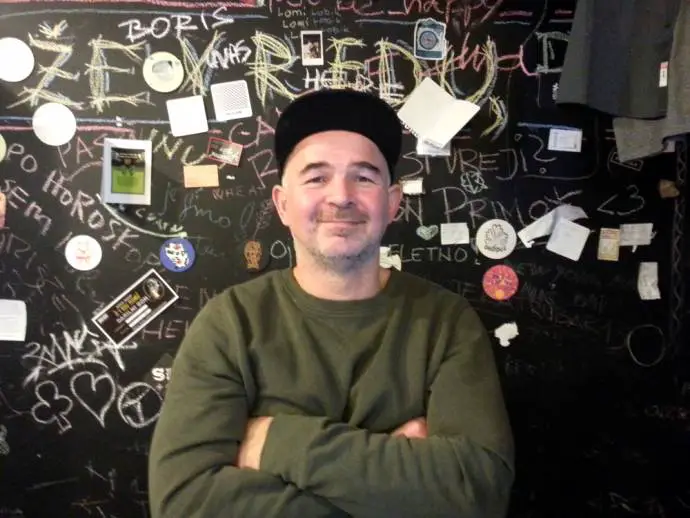
"When I go out I drink a pale ale, then an IPA, a sour, double IPA and finish with an imperial stout."
Here are four recent Slovenian craft beers, and one cider, that Damir has been enjoying, in the words of the man himself.
"Dr Orel is back. It was one of the first craft breweries in Slovenia, and it was totally focused on gluten free beer, which was good but ahead of its time. Now Hopsbrew (Domžale) have bought the licence and they’ve relaunched it, which I think is going to become more and more popular."
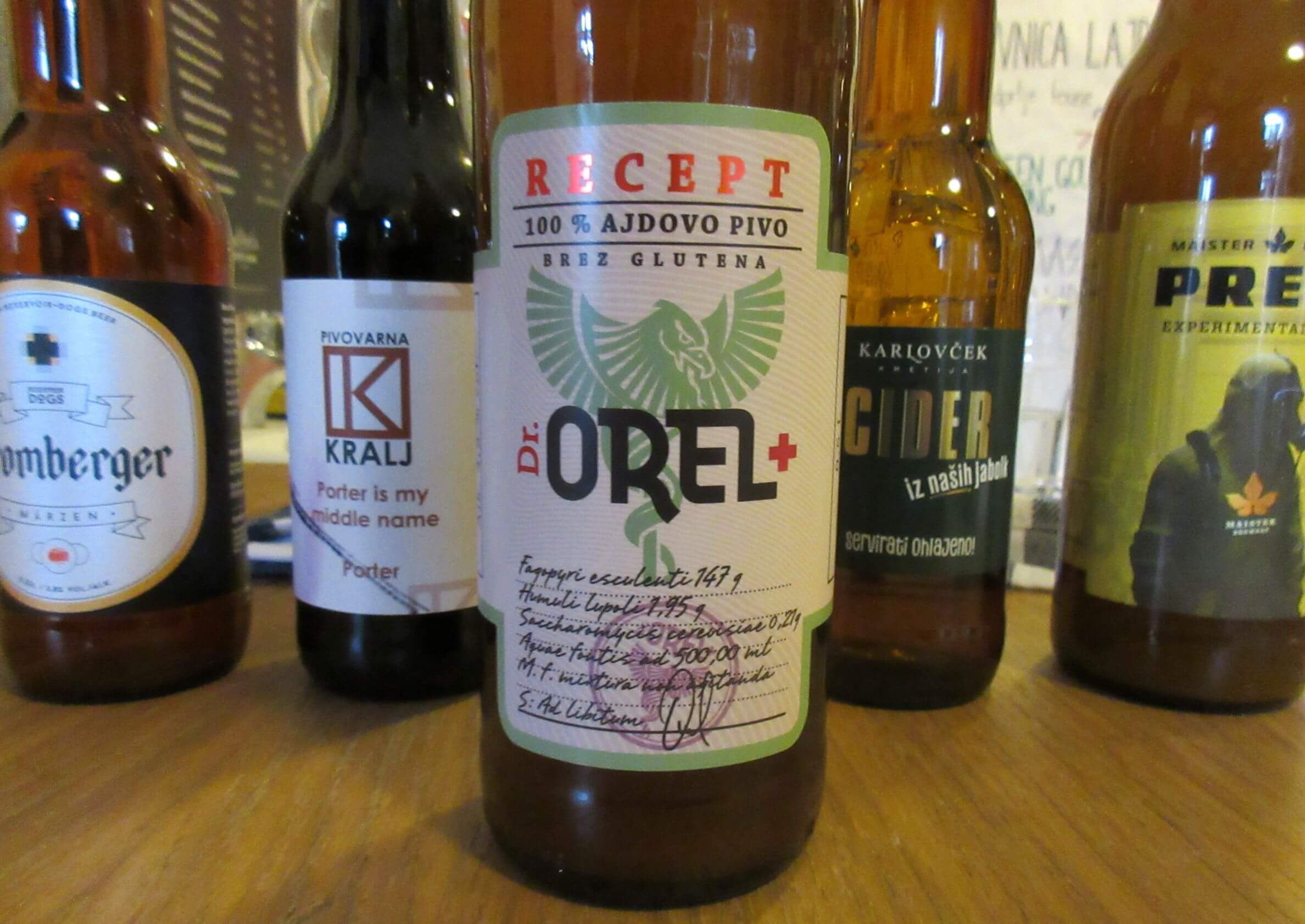
"This cider is from Karlovček, a small farm in Šentjernej with lots of apples, and so they started to make a craft cider. Of course it was very popular over the summer, but it’s gluten free and so on, so it’s something you can enjoy all the time."
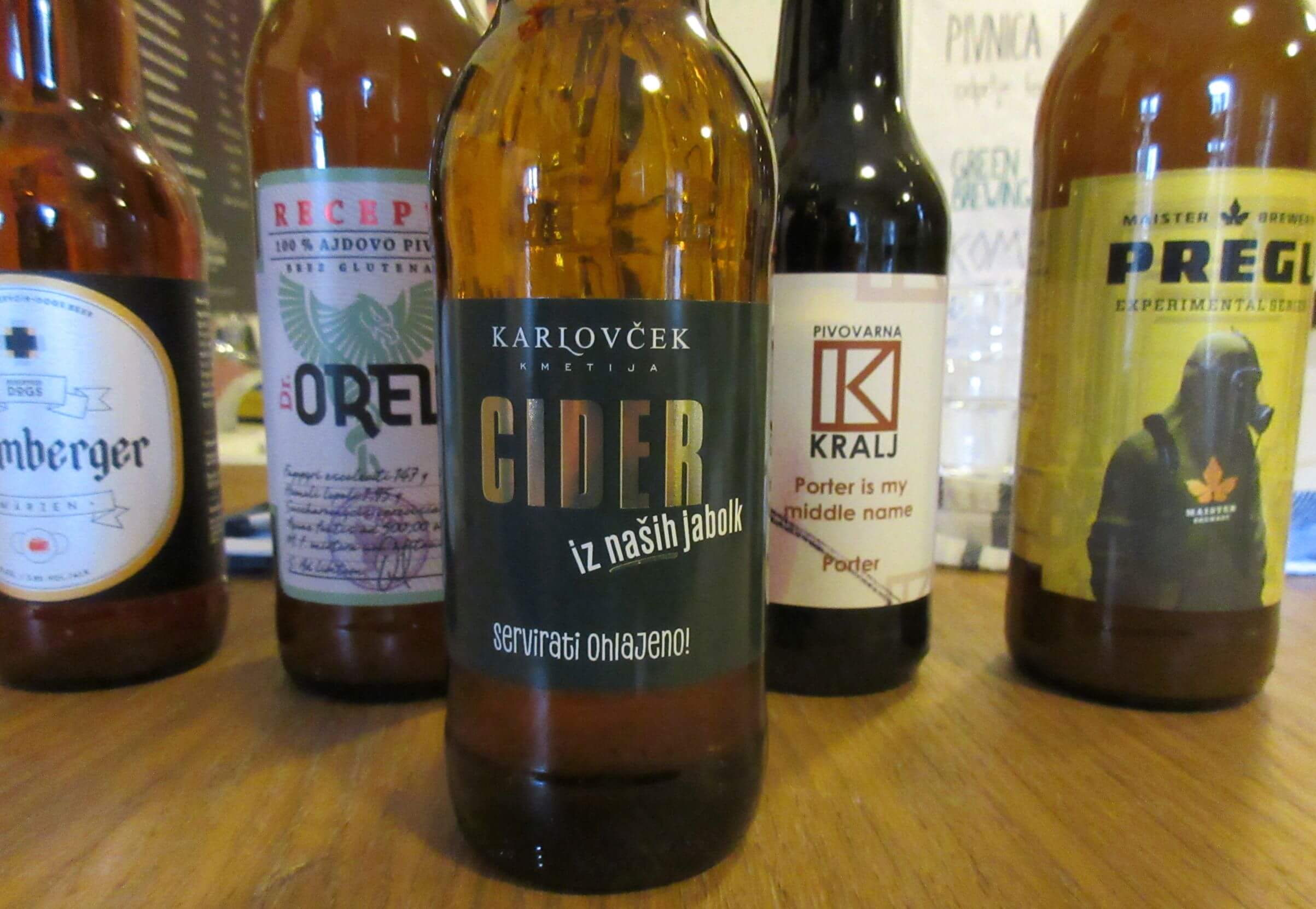
"This is a coffee porter from Pivovarna Kralj, a very small brewery with very nice beers, based on the outskirts of Ljubljana. They have an old farm that’s now a brewery. This porter is fantastic, which we also have on tap at Lajbah, with a very good price and performance. Going into autumn and winter the dark beers will be more popular, and this is a great one to sit on the couch in the evening and enjoy alone or with a friend."
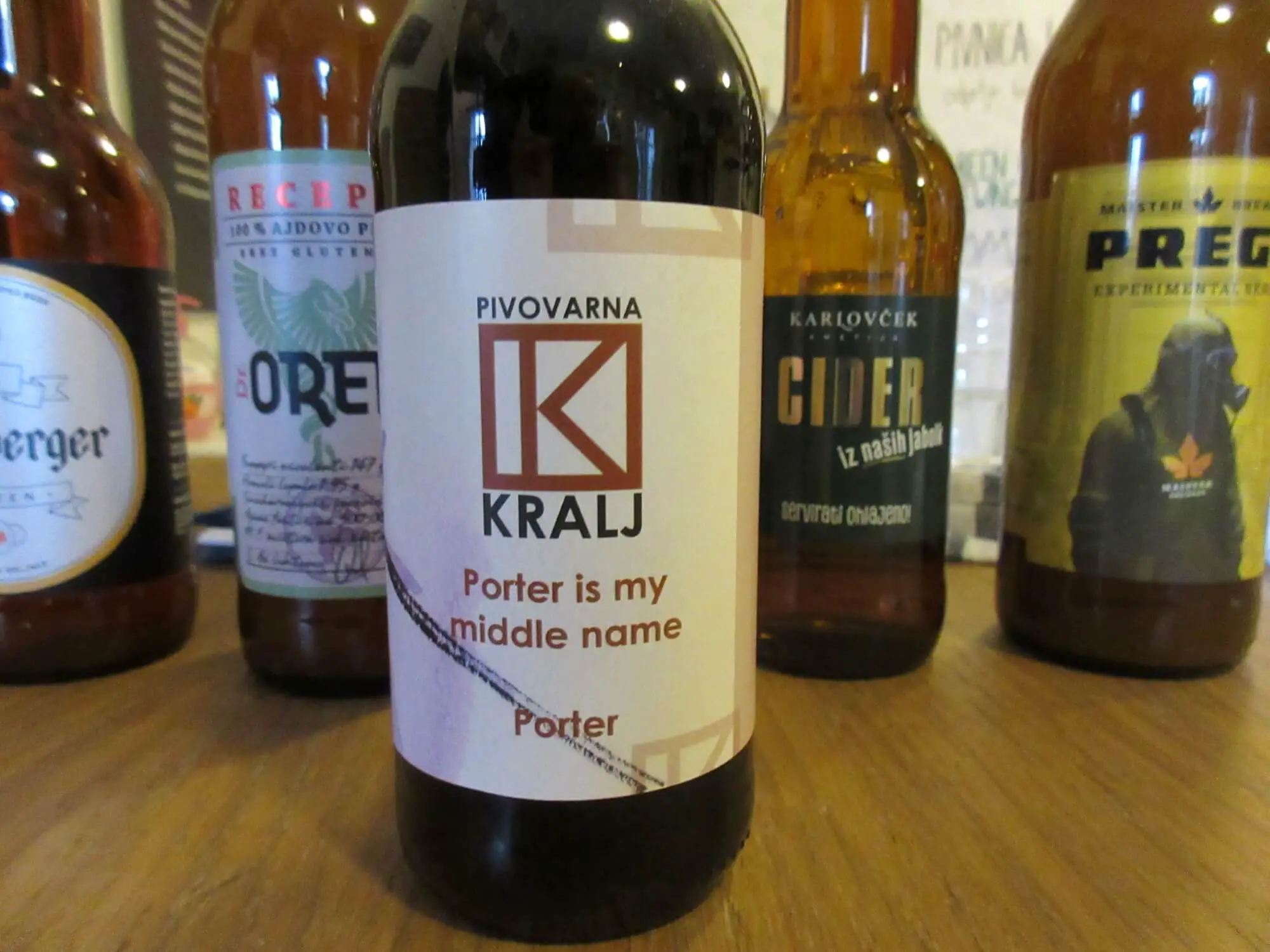
"This is the new Kromberger pilsner from Reservoir Dogs, in Nova Gorica. It’s a fresh beer, maybe just one month old, and a craft beer for people who don’t like craft beer."
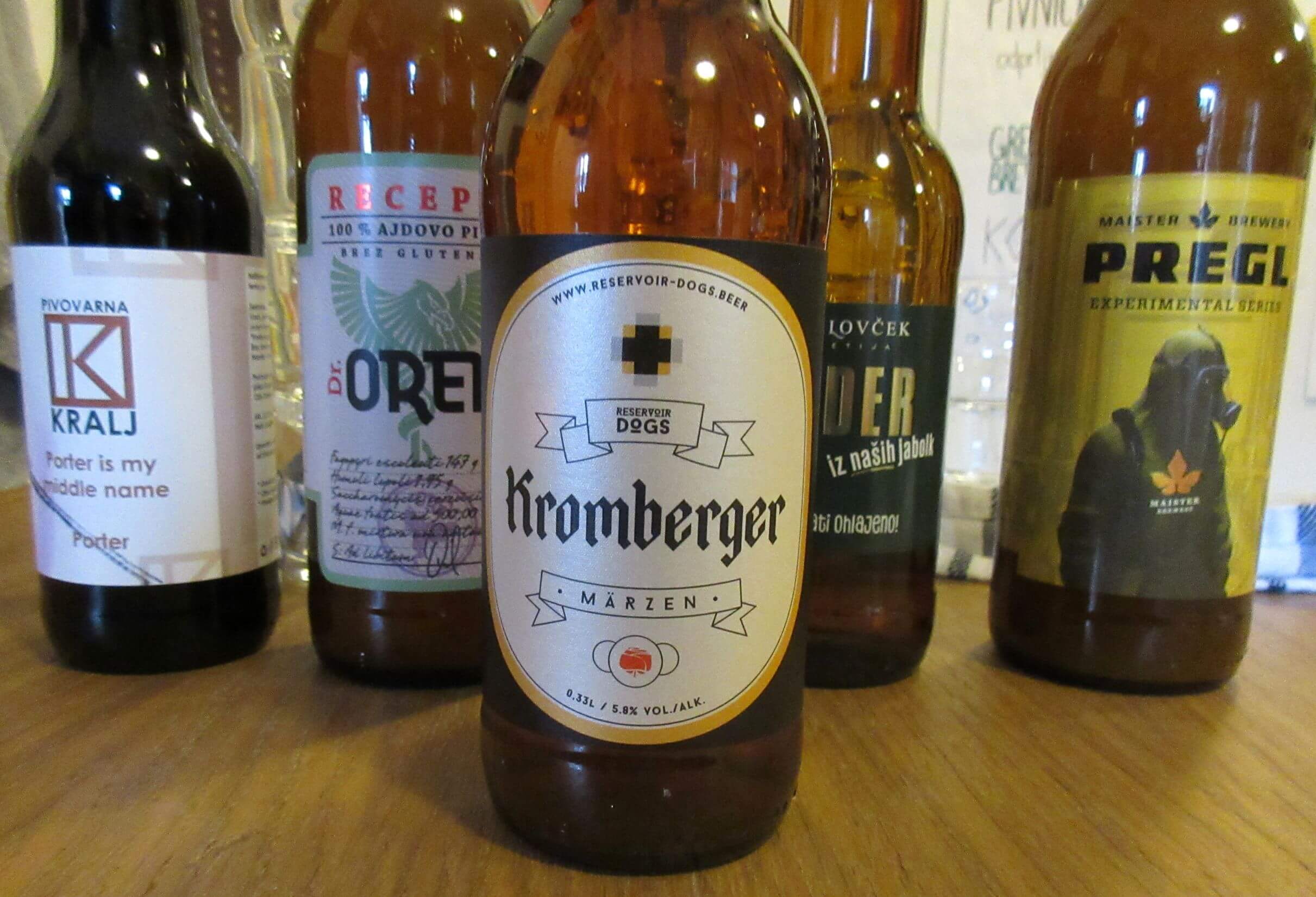
"Pregl is new beer from the experimental range of Kamnik’s Maister Brewery. A very nice sour with passionfruit and mango."
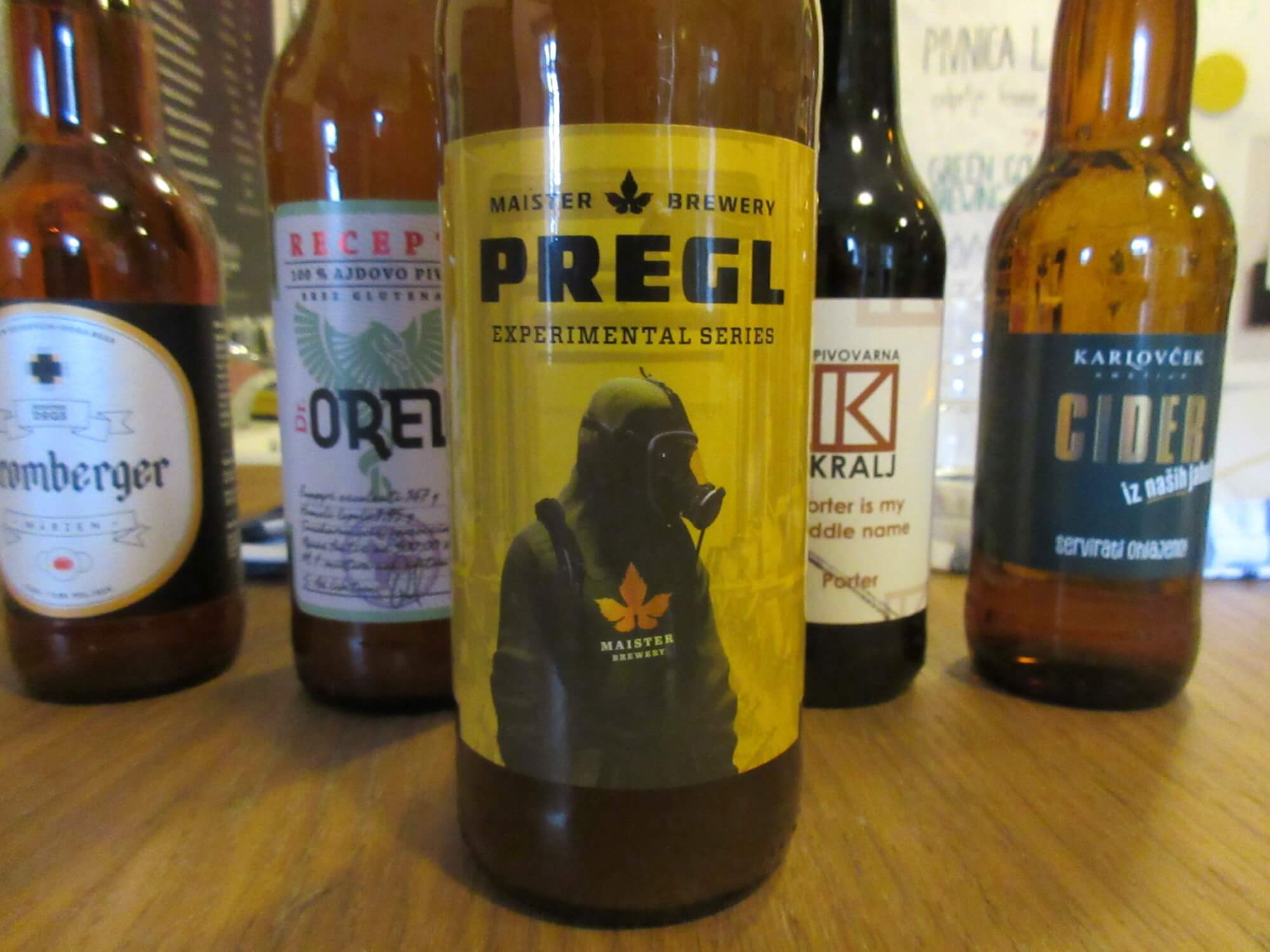
All our stories on craft beer in Slovenia are here
This summer, and until October 13, visitors have been able to experience a very unusual show held in the basement of the Slovenian National Gallery. The exhibition Alan Ford Runs a Victory Lap (Alan Ford teče častni krog) marks 50 years of the Italian comic book named Alan Ford and consists of 162 original boards created by a writer Luciano Secchi – aka Bunker – and artist Roberto Raviola – Magnus – in the years between 1969 and 1975. As the gallery proudly announced, this is the largest exhibition of Alan Ford boards so far, much bigger than the one in Rome which only displayed 30 of such originals.
So how come an Italian comic book has found its way to the Slovenian National Gallery, a place reserved for classic paintings, olds statues and even the original Robba Fountain, that was removed from the Town Square to protect it from rain and other damaging environmental influences?
One of the reasons for this lies in the fact that the comic was much bigger in Yugoslavia than it was in the land of its origin. Not that Alan Ford wasn’t popular in Italy, it’s just that in Yugoslavia it became a cultural phenomenon spread across the entire federation. As Izar Lunaček, a comic book artist commented on Alan Ford in an interview for a national broadcaster, artists from the former Yugoslavia are a bit of fed up with it, since every time they tell someone what they do for a living, the response is always the same, “Oh, I read Alan Ford!”
According to its writer, Bunker, Alan Ford draws on an old art form called commedia dell’arte set in a Cold War situation. The plot consists of a group of anti-Bond characters, who under the official name TNT group run secret government operations from a flower shop in Brooklyn, New York, a cover for their headquarters.
The characters, just like actors of commedia dell’arte, represent fixed social types. To name few of the group’s members:
Alan Ford is a naïve and handsome young man with a troubled love life, drawn to look like the British actor Peter O’Toole.
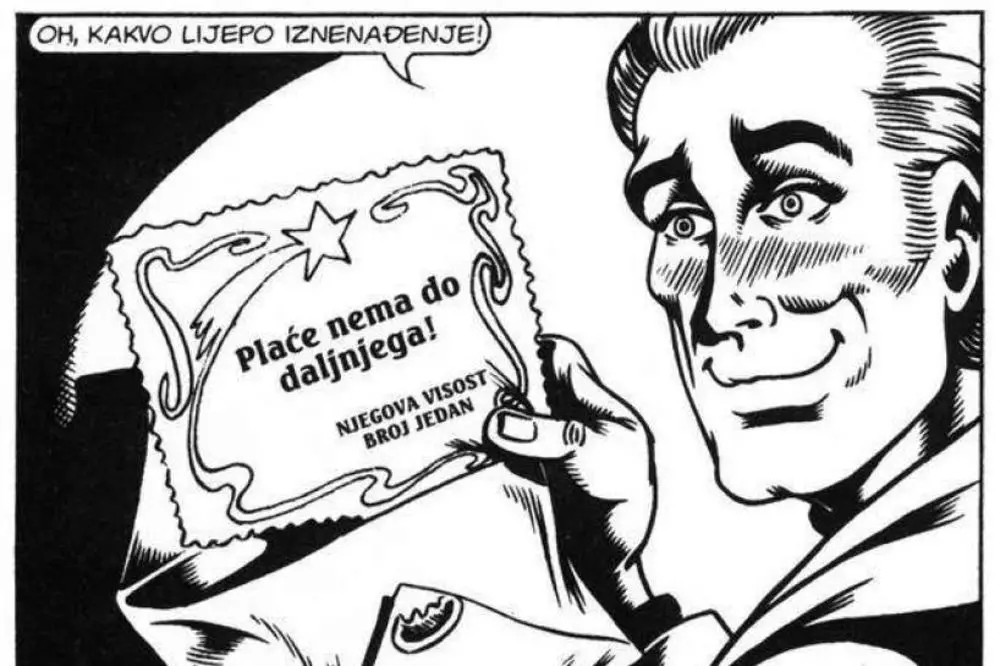
Number One is a cunning old man in a wheelchair, who is in charge of their secret operations. He is in possession a little black book full of compromising information on pretty much everyone, so it seems. He is also very miserly and keeps his agents in a state of constant poverty. He likes to tell them his life story, such as the role he played in Ancient Rome or the American Civil War.
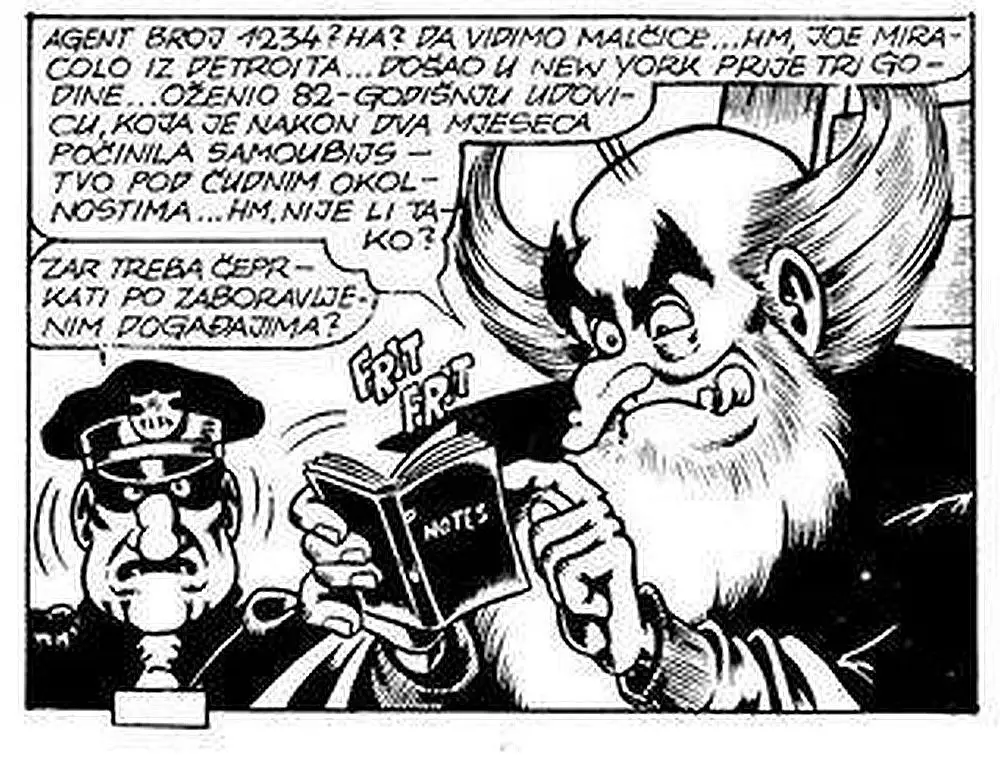
Sir Oliver is an English nobleman and a kleptomaniac, who manages to steal something in every episode, then calls his friend to sell the goods, repeating the line: “Price? A bargain.”
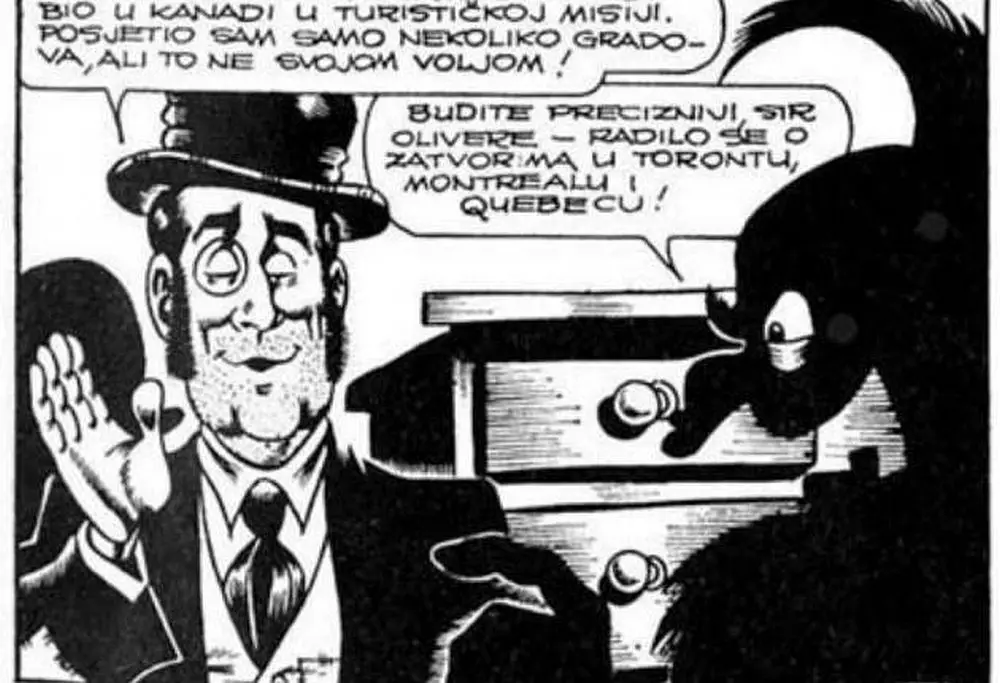
Bob Rock, from a family of criminals, is a very short agent with a quick temper and a large nose, which is the subject of many jokes (which then cause him to lose his temper). Bob Rock is also the most outspoken of the group when complaining about the poor working conditions they have to endure.

This is the decisive moment: better to live one hundred years as a millionaire, than one week in poverty!
Otto von Grunf is a German-born inventor, now a naturalised American, who fought in WWI and, as suggested on many occasions, in WWII as well. A coward full of false bravado he is in charge of the group’s gadget development, although these devices are mostly useless or make little sense.
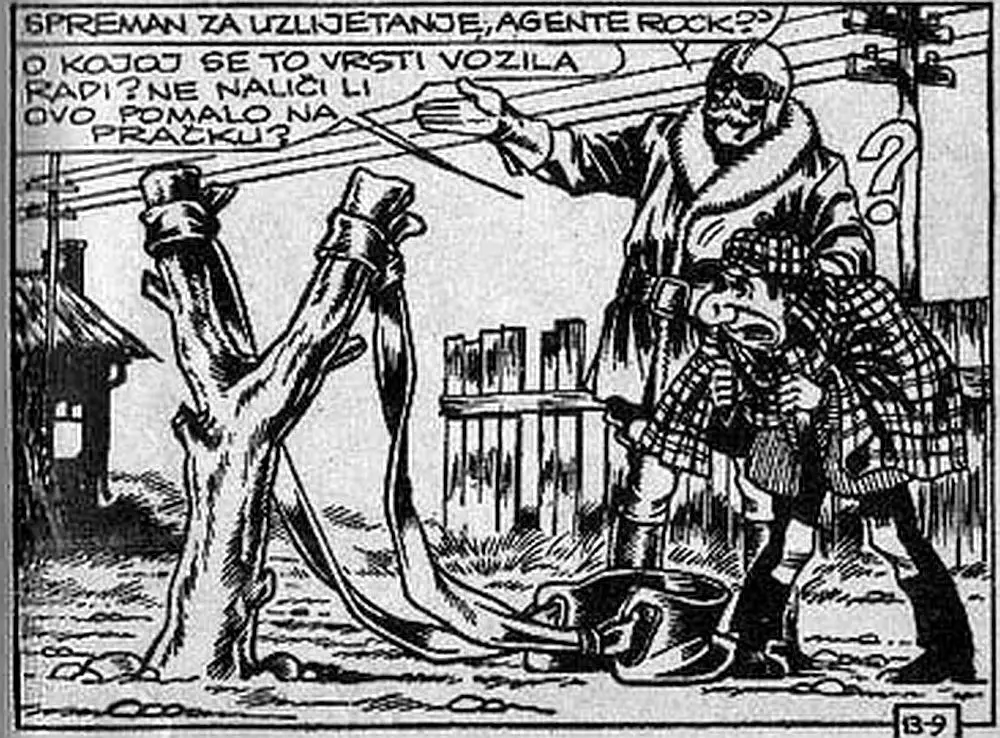
On the side of the villains the one worth mentioning is Superciuk (in Yugoslavia known as Superhik), or Superdrunk, a man who “steals from the poor to give to the rich”, a super anti-hero whose main weapon is his deadly breath, alimented with poor quality Barbera (wine) and onions. In ordinary life, Superhik is a street-sweeper.
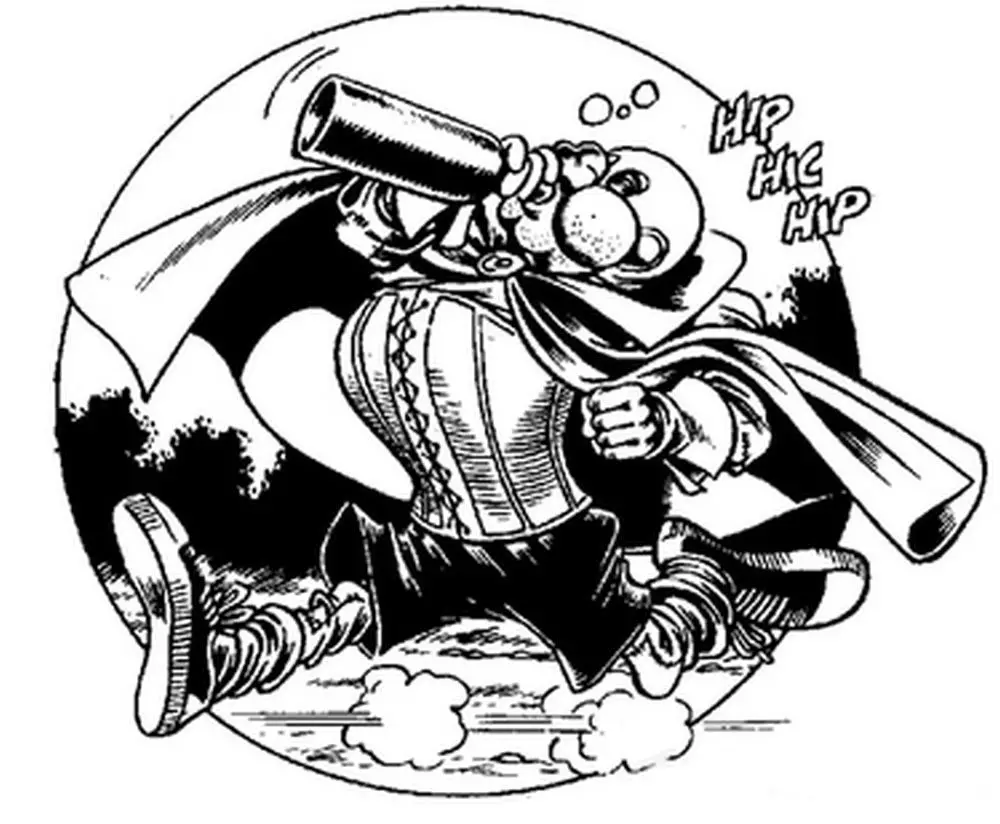
There have been numerous attempts at explanations of why this comic book was so big in Yugoslavia while other translations fared poorly. On reason why the comic didn’t succeed in other countries could certainly be found in the market. It could also be argued that perhaps other translations weren’t as masterfully done as Nenad Brixy’s, under the pseudonym Timothy Toucher. Brixy was also the person mostly responsible for introducing of the comic to the Yugoslav market in 1970, as the man not only found the comic in a shop in Trieste, but translated it into Croatian and as an entertainment editor of Vjesnik secured its publication. When a Slovenian translation emerged in 1993, it was accepted with mixed reviews, some people still continued to prefer the “original” Croatian version.
But this doesn’t explain why Alan Ford gained such a cult status among the Yugoslavs, who en masse identified with the absurdism of the comic.
In part the question was answered by the author, Bunker, himself, who has linked the comic with the tradition of commedia dell’arte.
In this 16th century theatrical form, actors play characters who represent fixed social types and as such improvise on a pre-set plot. Interestingly enough, such improvisation takes much more work than a fully scripted play would, as it involves a lot of practice using various contingency based on reactions from the audience and other actors.
Several scholarly articles have noted that such practice is in fact required from players of every democratic regime. However, “Whereas in English theatre the drama was built around personalities, in commedia dell'arte the characters were subordinate to the plot, as is also the case in democratic politics.”
Commedia dell’arte evades the modern notion of identity as a quest for authenticity in which a “true” self, distorted by a social role-playing, needs to be discovered and exhibited. Instead, role-playing is what constitutes the creation and re-creation of the reality, or “the truth”.
In an interview for the national broadcaster, Marcel Štefančič thus explains: “Why would you have a feeling that all of this was taking place in Yugoslavia? To be a Yugoslavian, that was a role. A Yugoslavian was constantly aware of the fact that they were playing a character. A Yugoslavian was always aware that they were playing a role and they accepted to play that role. They were aware of the gap between their mask, between their acting and the social reality. But they continued to act … These characters in Alan Ford, someone might think, were some sort of Yugoslav dissidents. No way, it was the other way around. A Yugoslavian dissident was certain that behind the mask, there exists some genuine truth. No, these Alan Ford characters lived in no illusion with regard to the fact that even the truth is only a mask.”
Or, to conclude with another quote, from Lazar Džamić, a researcher of the Balkan Alan Ford phenomenon, “Our natural environment, our system of social organisation is not socialism or communism, it is surrealism. This isn’t an art form, it’s what we’ve lived.”
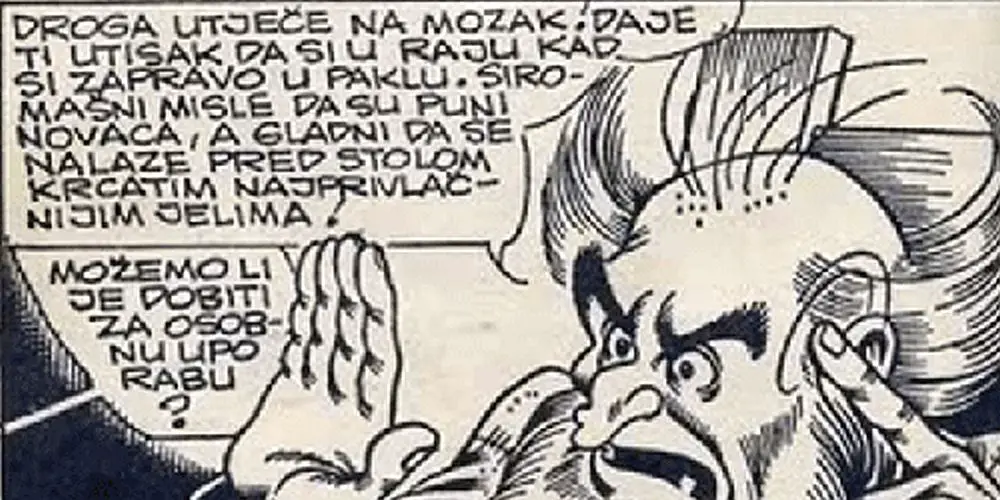
And thus Alan Ford remains, in newsstands, secondhand bookstores and homes across the former Yugoslavia, a window into a world that once was and in many ways continnues to be.
Ex-Yu Aviation reports that former employees of Adria Airways are claiming that a foreign carrier, which cannot be named for confidentiality reasons, is planning to set up a new business based at Ljubljana Airport, one that will hire some of the staff who lost their jobs in the collapse of the Slovenian carrier. The new firm would lease aircraft and use the Air Operator’s Certificate of its foreign owner, making a rapid start to operations possible. More details can be found here, while all our stories on Adria are here
STA, 9 October 2019 - Slovenia remained 35th in the latest World Economic Forum's Global Competitiveness Report, scoring 70.2 points on a scale from 0 to 100, up from 69.6 points last year. It ranks just behind Portugal and ahead of Saudi Arabia, while Singapore claimed the throne of the most competitive among 141 countries.
Slovenia received the maximum 100 points for its macroeconomic stability and scored 90 points for the situation in the health sector to rank 36th.
In infrastructure, it received 78 points, which earned it 33rd place, and ranked 26th in labour force know-how and skills (75 points).
Slovenia was given the lowest score, 48 points, for the size of its market (82nd place), followed by innovation ability (58 points and 28th place) and product market (62 points and 30th place).
The country improved its overall performance calculated from 12 pillars, by 0.6 points compared to 2018, when it climbed 13 spots due to changes in the methodology.
The list was bottomed by Chad, while Singapore took over the top post from the US, which dropped to the second place because of trade wars led by its President Donald Trump. Hong Kong is third, followed by the Netherlands and Switzerland, which topped the list in 2017.
Germany lost four places to rank 7th and the UK lost one spot to place 9th.
The average score of the 141 countries involved in the survey this year is 61 points.
A PDF of the full report can be found here
STA, 9 October 2019 - Economy Minister Zdravko Počivalšek expects that a draft agreement creating safeguards for Slovenian suppliers of retailer Mercator after its transfer to Fortenova will be ready soon. He was assured today that the retail group would not be cut up into pieces.
Počivalšek met representatives of Mercator suppliers, its bankrupt Croatian owner Agrokor, Agrokor's successor Fortenova, and its key creditor, Russian Sberbank in Ljubljana on Wednesday following reports that Fortenova was planning to cut off the Slovenia-based core company from its subsidiaries in Croatia, Bosnia and Serbia.
Related: Secret Plans to Cut Mercator into Parts to Repay Owner’s Debt to Sberbank
Speaking to reporters, the minister said that such a slash-up of Mercator would be unacceptable for the government. He was assured at the meeting today that a plan to that effect was not in the making.
He reiterated Slovenia's desire for Mercator to be allowed to continue to grow and develop. Being Slovenia's largest grocer, Mercator is an important company for the country in terms of jobs, suppliers and the revenue it generates, Počivalšek said.
He added that the government expected that the Slovenian suppliers would preserve an equal status under economic terms in the new group, and that Fortenova ensures Mercator's growth and development, and keep the group headquartered in Ljubljana.
"If they can guarantee us that, we won't have any problem with Mercator's transfer to Fortenova," he said, even though he does not have direct leverage on the process.
He noted that he had told as much to Russian officials at the Saint Petersburg Economic Forum last year and during Prime Minister Marjan Šarec's recent visit to Moscow, so he was critical the matter had not been dealt with.
He expects that Slovenian suppliers can agree a draft deal securing their present position on Mercator shelves also in the future with Fortenova and Sberbank within 10 days.
The suppliers' representative Izidor Krivec said the agreement could be agreed next week, by which time it needs to be aligned with the commitments negotiated by Croatian suppliers of Fortenova, as well a mechanism defined to monitor whether the agreement is being honoured.
The commitments would roughly pertain to a five-year period, but Krivec believes that they can keep their position also in the future as the consumer would dictate the choice on store shelves.
Fortenova's business policy would give priority to local suppliers, while Slovenian suppliers would like to come first in Slovenia, and right behind local suppliers in other markets.
Krivec also said that they had been given clear assurances today that Mercator would stay headquartered in Ljubljana, and that it would preserve its comprehensive business system.
Krivec expects Fortenova officials to honour their promises. Fortenova is to develop Mercator as the leading retailer in the region, invest in it and boost it. If so, Krivec is not concerned about Slovenian suppliers losing their market shares.
Agrokor's assets cannot be transferred to Fortenova until it gets a regulatory approval and the go-ahead from the 56 creditor banks of Mercator, including the Slovenian state-owned SID Bank.
When asked whether the agreement protecting Slovenian suppliers would prompt SID Bank to give its go-ahead, Počivalšek said the decision would be taken once the agreement was clinched.
STA, 9 October 2019 - The public health insurance fund ZZZS marked today the 130th anniversary of health insurance in Slovenia. The concept was formally introduced on 1 August 1889 with the launch of the first sickness fund involving compulsory health insurance in Ljubljana.
The local fund was modelled on Bismarck's social insurance for workers, while it was based on legislation issued in the Austro-Hungarian Empire on 6 April 1888.
The solidarity-based fund provided access to healthcare to all workers and their families. The right is enjoyed today by everybody in Slovenia and individual benefits have been expanded, but the basic features were already there in 1889.
The first sickness funds provided workers with a sickness allowance amounting to 60% of their usual pay, however for a maximum of 20 weeks. They were also entitled to a doctor, to medication as well hospital treatment, but for four weeks at the most.
Moreover, women were entitled to 60% of the average pay the first month after giving birth and the purse also paid out a funeral allowance to the family of the deceased amounting to the average pay for 20 days of work.
Addressing the anniversary ceremony, ZZZS director general Marjan Sušelj urged securing the health system's sustainability in the long run, also by increasing state budget finding.
The ZZZS gets 96% of its funds from mandatory health insurance and "when the economy dose worse, there will be less in contributions. Excessive dependence on a single source of contributions poses a major risk," Sušelj told reporters.
He favours abolishing top-up insurance in its current form, although he does not think this will solve the issue of the system's sustainability.
Due to the population's ageing and introduction of new medical technologies, Šušelj believes private funding should be included in the system and the basket of health insurance rights should be reassessed.
Health Minister Aleš Šabeder also noted the need to shift to a financing system that would be more resilient to potential fiscal crises, and to ensure suitable access to health services.
The ceremony was also addressed by parliament Speaker Dejan Židan, who said that universal access to public health services should not be just a catchphrase.




